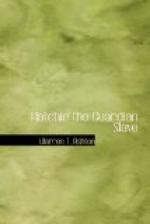“Day after day,
day after day,
We stuck,—nor
breath, nor motion,—
As idle as a painted
ship
Upon a painted ocean.”
ANCIENT MARINER.
It was about the time of the events related in the preceding chapters, at the close of a variable day, in which the storm and sunshine seemed to struggle for the ascendency, that a plain-looking, home-made sort of man might have been seen attempting to effect a safe transit of the steamboat levee at New Orleans. This personage was no other than Mr. Nathan Benson, commonly called at home “Uncle Nathan.” He was one of the better class of New England farmers, an old bachelor, well to do in the world, and was now engaged in the laudable enterprise of seeing the country.
Uncle Nathan, though he laid no claims to gentility in the popular signification of the term, was, nevertheless, a gentleman,—one of Nature’s noblemen. He was dressed scrupulously neat in every particular, though a little too rustic to suit the meridian of fashionable society. He presented a very respectable figure, in spite of the fact that the prevailing “mode” had not been consulted in the fashioning of his garments. His coat was, without doubt, made by some village tailoress, for many of the graces with which the masculine artist adorns his garments were entirely wanting in those of our worthy farmer. His hat was two inches too low in the crown, and two inches too broad in the brim, for the style; still it was a good-looking and a well-meaning hat, for it preserved the owner’s phiz from the burning rays of the sun much better than the “mode” would have done. His boots, though round-toed and very wide, were nicely polished when he commenced the passage of the levee, but were now encased in a thick coating of yellow clay.
Uncle Nathan was a medium-sized man, and preserved as much of nature’s grace as a man can who has labored for five-and-thirty years at the stubborn soil of New England. His hair was sandy, and his full, good-natured physiognomy was surrounded by a huge pair of reddish whiskers.
The superficial, worldly-minded man would have deemed Uncle Nathan’s principles rather too ultra for common, everyday use; but he, good soul, found no difficulty in applying them to every action he performed. He was, to use a common phrase, a “professor of religion;” but, less technically, he was more than a professor, and strove to live out the spirit of truth and righteousness.
After much difficulty, Uncle Nathan succeeded in effecting a safe passage to the planking which formed the landing for the boats. After a glance of vexation at the soiled condition of his boots (Uncle Nathan was a bachelor!), he commenced his search for an upward-bound steamer, for he was about to begin his homeward tour. Two columns of dense black smoke, the hissing noise of escaping steam, and the splashing paddles of a boat a short distance down the stream, attracted his




